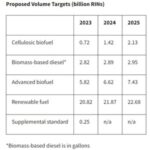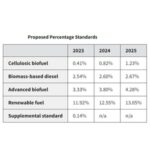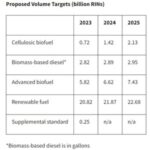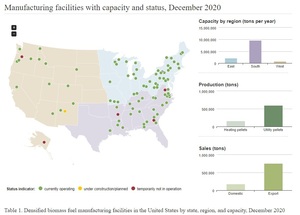EPA issues final rule extending RFS compliance deadlines
Energy Disrupter
ADVERTISEMENT
The U.S. EPA released a final rule on Jan. 28 extending and modifying certain Renewable Fuel Standard compliance deadlines. Representatives of the biofuels industry are criticizing the EPA’s actions and calling for the agency to get the RFS back on track.
The rule extends the RFS compliance deadline for the 2109 compliance year for small refineries only. The new 2019 compliance deadline for small refineries will be the next quarterly reporting deadline after the effective date of the 2021 RFS standards.
The rule extends the 2020, 2021 and 2022 compliance deadlines for all parties, with the 2020 compliance deadline set at the next quarterly reporting deadline after the 2019 compliance deadline for small refineries. The 2021 compliance deadline will be the next quarterly reporting deadline after the 2020 compliance deadline. The rule sets the 2022 compliance deadline at the next quarterly reporting deadline after either the effective date of the 2023 RFS standards or the 2021 compliance deadline, whichever is later.
For compliance years 2019-2022, the rule extends the associated attest engagement reporting deadlines to the next June 1 attest engagement reporting deadline after the applicable 2019-2022 compliance deadline.
For compliance years 2023 and later, the EPA has changed the way RFS compliance and attest engagement report deadlines are set. According to the agency, the annual compliance reporting deadline will be set at the latest date of three options, including March 31 of the subsequent calendar year, the next quarterly reporting deadline after the effective date of the final rule establishing the subsequent compliance year’s RFS standards, or the next quarterly reporting deadline after the annual compliance reporting deadline for the prior compliance year. The annual attest engagement reporting deadline will be set the latest date of two options, either June 1 of the subsequent calendar year or the next June 1 attest engagement reporting deadline after the annual compliance reporting deadline.
According to the EPA, the deadline changes “will help ensure that obligated parties are positioned to fully comply with their RFS obligations by ensuring that each year’s compliance deadline falls after the standards for the subsequent compliance year are known.” The agency also said its new approach to deadlines for 2023 and later compliance years will avoid the agency from “having to repeatedly extend compliance deadlines for obligated parties should promulgation of the subsequent year’s standards be delayed.”
Growth Energy has criticized the compliance deadline delays and is calling on the EPA to get the RFS back on track. “Delaying compliance deadlines is completely contradictory to efforts to lower rising gas prices and increase the use of cleaner, lower-carbon fuels,” said Emily Skor, CEO of Growth Energy. “By continuing to delay compliance deadlines, EPA is creating uncertainty in the marketplace and stunting the blending of biofuel needed to decarbonize transportation as the Renewable Fuel Standard intended.
“Moving ahead, it is vital for EPA to get the RFS back on track. EPA can start by making needed changes to its proposed cuts to the 2020 RVOs and low volumes for 2021,” Skor continued. “Importantly, EPA needs to swiftly finalize the proposed volumes for 2022. Administrator Regan has emphasized time and time again the need for transparency and certainty when it comes to the RFS. Ensuring timely compliance and finalizing strong biofuel blends can help Administrator Regan follow through on these promises and provide much needed certainty for biofuel producers.”
The Renewable Fuels Association is also speaking out against the EPA’s action on RFS deadlines. “Today’s action by EPA is very disappointing, and we are especially concerned by the new approach the agency is taking to future RFS compliance deadlines,” said Geoff Cooper, president and CEO of the RFA. “With this final rule, EPA just gave itself the power to perpetually delay implementation of yearly RFS blending requirements and continually kick the can down the road on compliance deadlines. This is not what Congress intended, and this approach could exacerbate the uncertainty and instability around RFS implementation that was created by the past administration. Ethanol producers, farmers, fuel retailers, and refiners need and deserve certainty and predictability when it comes to RFS implementation timelines. That’s why Congress put certain annual deadlines into the law for RFS implementation.”
Additional information, including a full copy of the final rule, is available on the EPA’s website.
















